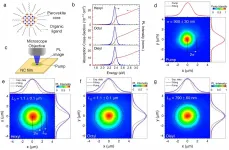(Press-News.org) A major risk of being hospitalised is catching a bacterial infection.
Hospitals, especially areas including intensive care units and surgical wards, are teeming with bacteria, some of which are resistant to antibiotics - they are infamously known as 'superbugs'.
Superbug infections are difficult and expensive to treat, and can often lead to dire consequences for the patient.
Now, new research published today in the prestigious journal Nature Microbiology has discovered how to revert antibiotic-resistance in one of the most dangerous superbugs.
The strategy involves the use of bacteriophages (also known as 'phages').
"Phages are viruses, but they cannot harm humans," said lead study author Dr Fernando Gordillo Altamirano, from the Monash University School of Biological Sciences.
"They only kill bacteria."
The research team investigated phages that can kill the world's leading superbug, Acinetobacter baumannii, which is responsible for up to 20 per cent of infections in intensive care units.
"We have a large panel of phages that are able to kill antibiotic-resistant A. baumannii," said Dr Jeremy Barr, senior author of the study and Group Leader at the School of Biological Sciences and part of the Centre to Impact AMR.
"But this superbug is smart, and in the same way it becomes resistant to antibiotics, it also quickly becomes resistant to our phages," Dr Barr said.
The study pinpoints how the superbug becomes resistant to attack from phages, and in doing so, the superbug loses its resistance to antibiotics.
"A. baumannii produces a capsule, a viscous and sticky outer layer that protects it and stops the entry of antibiotics," said Dr Gordillo Altamirano.
"Our phages use that same capsule as their port of entry to infect the bacterial cell.
"In an effort to escape from the phages, A. baumannii stops producing its capsule; and that's when we can hit it with the antibiotics it used to resist."
The study showed resensitisation to at least seven different antibiotics.
"This greatly expands the resources to treat A. baumannii infections," Dr Barr said.
"We're making this superbug a lot less scary."
Even though more research is needed before this therapeutic strategy can be applied in the clinic, the prospects are encouraging.
"The phages had excellent effects in experiments using mice, so we're excited to keep working on this approach," said Dr Gordillo Altamirano.
"We're showing that phages and antibiotics can work great as a team."
INFORMATION:
Producing clean energy and reducing the power consumption of illumination and personal devices are key challenges to reduce the impact of modern civilization on the environment. As a result, the surging demand for solar cells and light-emitting devices is driving scientists to explore new semiconductor materials and improve their performances, while lowering the production costs.
Semiconductor nanocrystals (materials with sizes about 10 nanometers, which is approximately 10,000 times thinner than our hair) hold great promise for these applications: they are cheap to produce, can be easily integrated in these devices and possess exceptionally enhanced properties upon interaction with ...
Curtin University researchers have used ancient crystals from eroded rocks found in stream sediments in Greenland to successfully test the theory that portions of Earth's ancient crust acted as 'seeds' from which later generations of crust grew.
The findings not only advance an understanding of the production of the Earth's crust through deep time, along with its structure and composition, but reveal a planet-wide crustal growth spurt three billion years ago when mantle temperatures peaked.
Lead author Professor Chris Kirkland, from Curtin University's Timescales of Mineral Systems ...
You are likely familiar with the serious consequences of anorexia for those who experience it, but you might not be aware that the disorder may not be purely psychological. A recent review from researchers at the University of Oxford in the open-access journal END ...
Highlights:
Severe cases of COVID-19 often include GI symptoms
Chronic diseases associated with severe COVID-19 are also associated with altered gut microbiota
A growing body of evidence suggests poor gut health adversely affects prognosis
If studies do empirically demonstrate a connection between the gut microbiota and COVID-19 severity, then interventions like probiotics or fecal transplants may help patients
Washington, D.C. - January 12, 2021 - People infected with COVID-19 experience a wide range of symptoms and severities, the most commonly reported including high fevers ...
PHILADELPHIA -- (Jan. 12, 2021) -- Scientists at The Wistar Institute have created an advanced humanized immune system mouse model that allows them to examine resistance to immune checkpoint blockade therapies in melanoma. It has revealed a central role for mast cells. These findings were published today in the journal Nature Communications.
Checkpoint inhibitors revolutionized therapeutic options for advanced melanoma. However, only a fraction of patients respond to this treatment and some relapse due to reemergence of therapy-resistant lesions.
"To better understand why some cancers do not respond or become resistant to checkpoint therapies, ...
Imagine you gave the exact same art pieces to two different groups of people and asked them to curate an art show. The art is radical and new. The groups never speak with one another, and they organize and plan all the installations independently. On opening night, imagine your surprise when the two art shows are nearly identical. How did these groups categorize and organize all the art the same way when they never spoke with one another?
The dominant hypothesis is that people are born with categories already in their brains, but a study from the Network Dynamics Group (NDG) at the Annenberg School for Communication has discovered a novel explanation. In an experiment in which people were asked to categorize unfamiliar shapes, individuals and small groups created ...
New research has found as climate change causes the world's oceans to warm, baby sharks are born smaller, exhausted, undernourished and into environments that are already difficult for them to survive in.
Lead author of the study Carolyn Wheeler is a PhD candidate at the ARC Centre of Excellence for Coral Reef Studies at James Cook University (Coral CoE at JCU) and the University of Massachusetts. She examined the effects of increased temperatures on the growth, development and physiological performance of epaulette sharks--an egg-laying species found only ...
COLUMBUS, Ohio - An unfortunate truth about the use of mechanical ventilation to save the lives of patients in respiratory distress is that the pressure used to inflate the lungs is likely to cause further lung damage.
In a new study, scientists identified a molecule that is produced by immune cells during mechanical ventilation to try to decrease inflammation, but isn't able to completely prevent ventilator-induced injury to the lungs.
The team is working on exploiting that natural process in pursuit of a therapy that could lower the chances for lung damage in patients on ventilators. Delivering high levels of the helpful molecule with a nanoparticle was effective ...
Abu Dhabi, United Arab Emirates, January 12, 2020: New research from NYU Abu Dhabi's Laboratory of Neural Systems and Behavior for the first time used an animal model to demonstrate how abnormal sleep architecture can be a predictor of stress vulnerability. These important findings have the potential to inform the development of sleep tests that can help identify who may be susceptible -- or resilient -- to future stress.
In the study, Abnormal Sleep Signals Vulnerability to Chronic Social Defeat Stress, which appears in the journal Frontiers in Neuroscience, NYUAD Assistant Professor of Biology Dipesh Chaudhury and Research Associate Basma Radwan describe their development of a mouse ...
ORLANDO, Fla. -- A new national survey by the Orlando Health Heart & Vascular Institute finds many Americans would delay doctor's appointments and even emergency care when COVID-19 rates are high. The survey found 67 percent of Americans are more concerned about going to medical appointments when COVID-19 rates are high in their area and nearly three in five (57 percent) are hesitant to go to the hospital even for an emergency.
In a time when every trip out of the house and every person we come in contact with poses a threat of contracting COVID-19, ...




